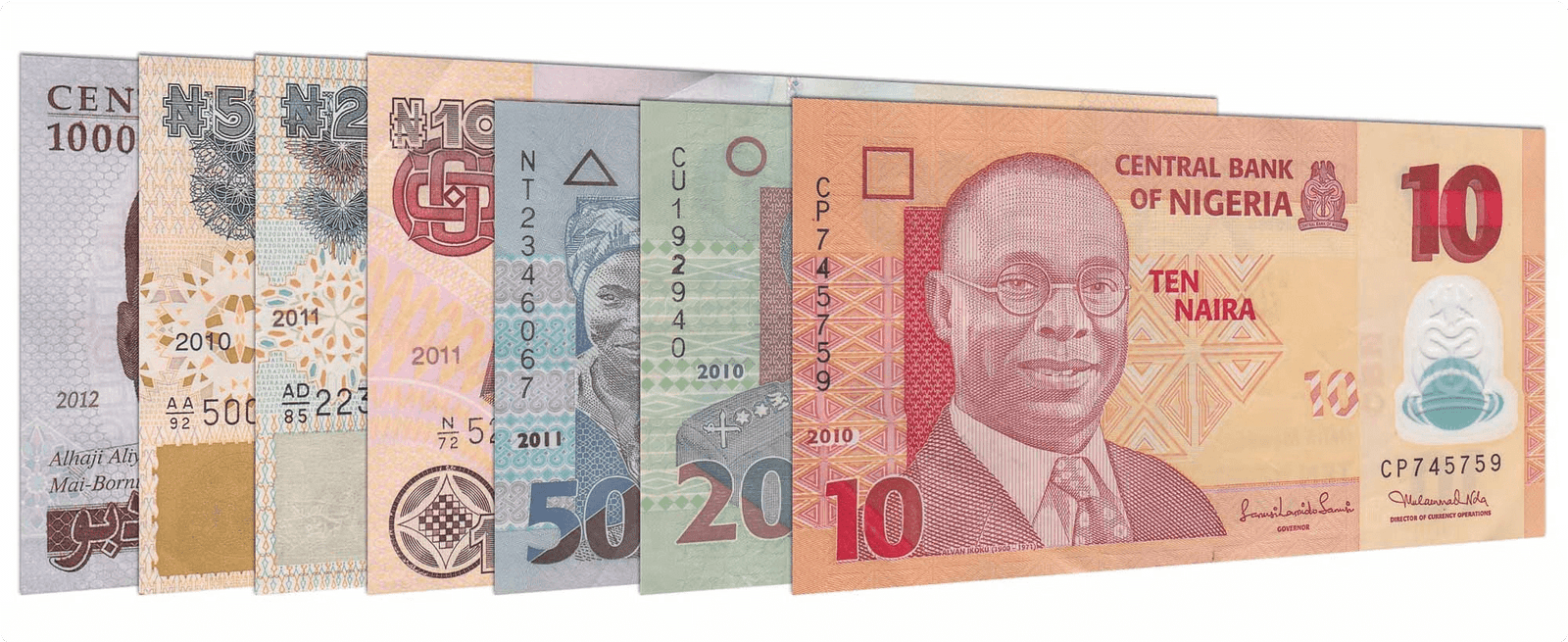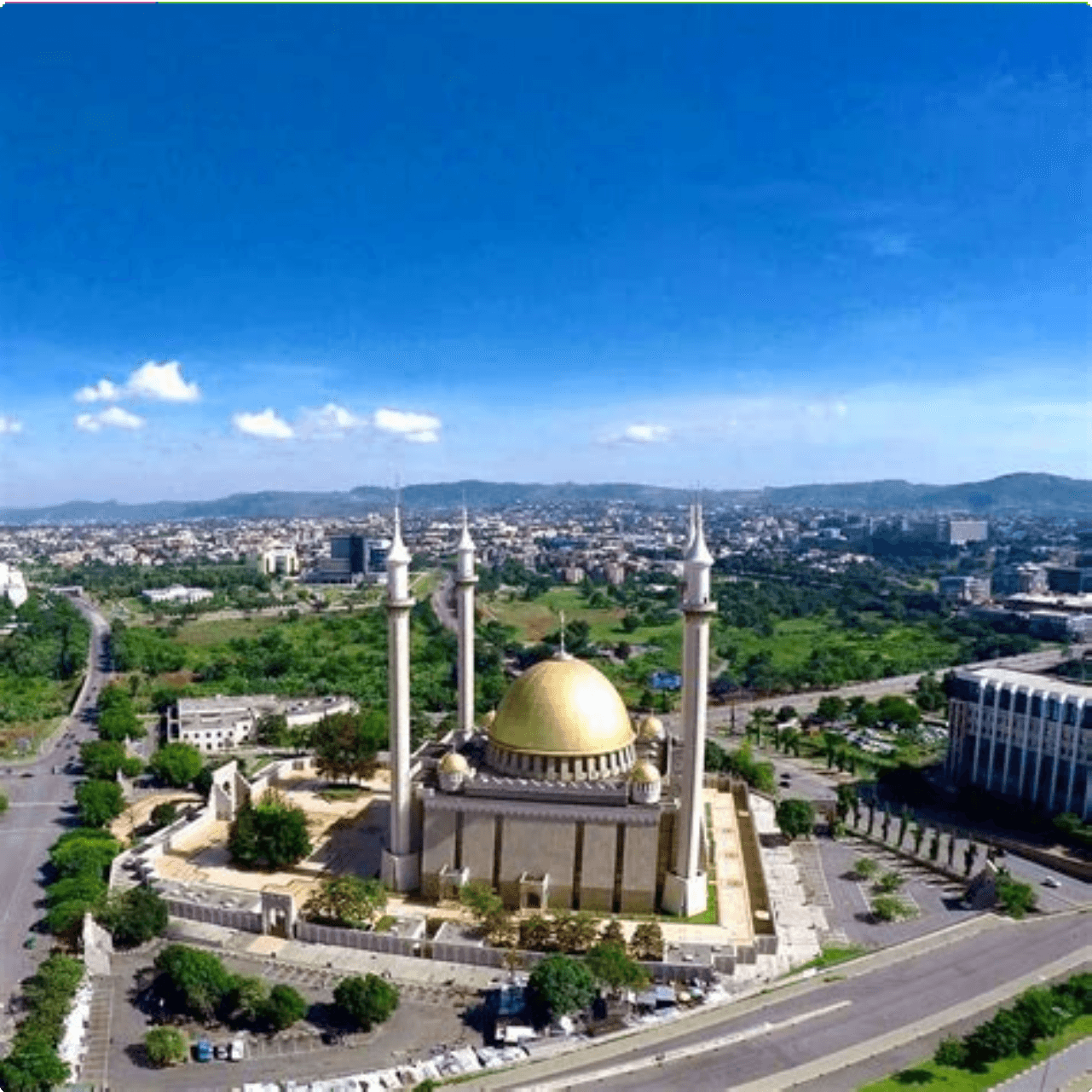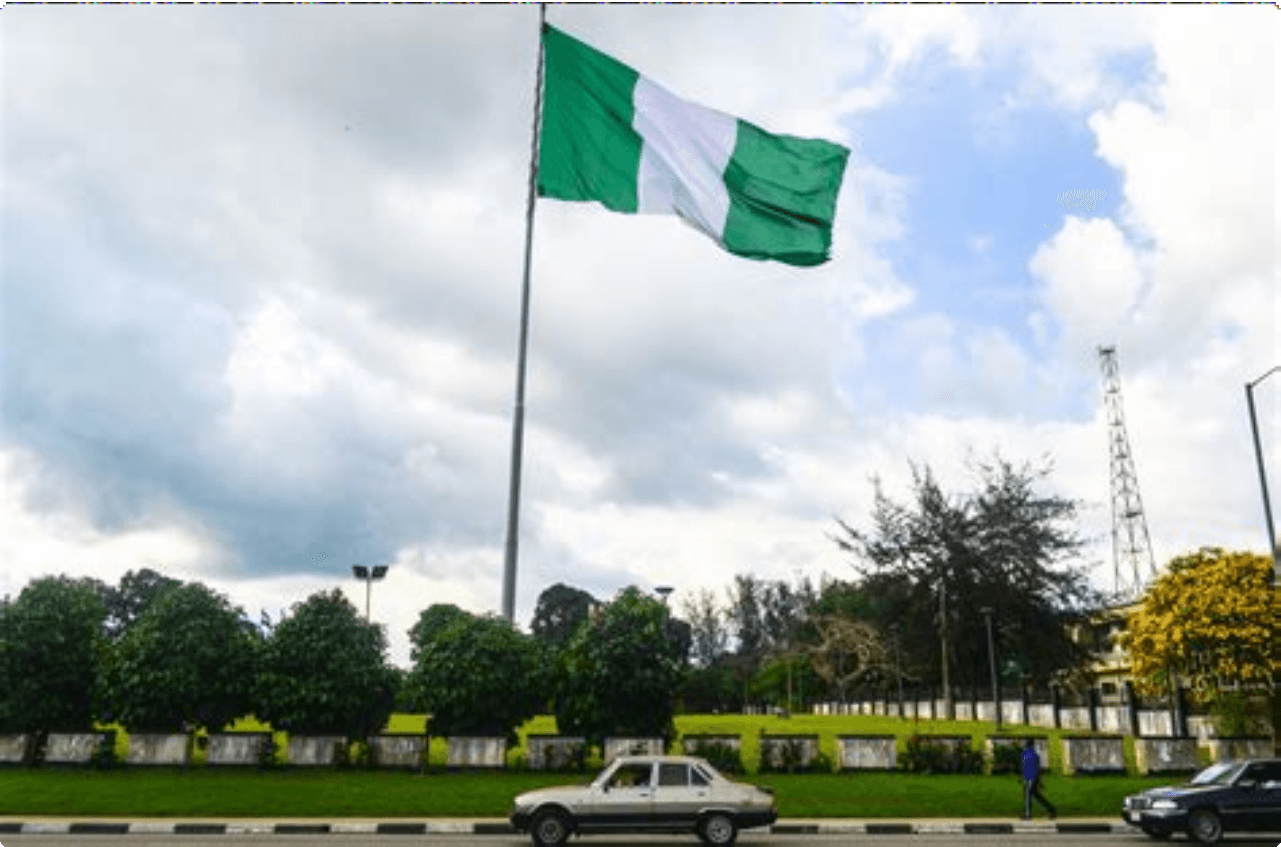Nigeria
Discover Nigeria
Nigeria, a country located in West Africa, is known for its diverse culture, rich history, and vibrant traditions. Home to over 250 ethnic groups, Nigeria boasts a fusion of captivating dance forms, delectable culinary delights, and a thriving arts scene. The country’s currency, the Nigerian naira, reflects its economic significance as one of the largest economies in Africa. From the bustling markets to the lively music scene, Nigeria is a land of boundless energy and creativity, making it a must-visit destination for travelers seeking an immersive cultural experience.

Nigerian Flag
The Nigerian flag consists of three vertical bands of green, white, and green. The green stripes represent Nigeria’s lush vegetation and agricultural wealth, while the white band symbolizes the desire for peace and unity within the country. The flag was designed in 1959 and officially adopted on October 1, 1960, the day Nigeria gained independence from British colonial rule. The flag’s simple yet powerful design is a source of pride for Nigerians and embodies the nation’s unity and diversity.

The flag’s colors and symbolism reflect Nigeria’s natural beauty, the aspiration for peace, and the strength of its people. The flag is prominently displayed during national holidays, celebrations, and official events, serving as a unifying symbol for the diverse population of Nigeria.
Nigerian Map
Nigeria, located in West Africa, is known for its diverse landscapes, from the vast savannas in the north to the lush Niger Delta in the south. The Nigerian map is a beautiful representation of this diversity, showcasing its many states, major cities, and natural landmarks.

The country’s capital, Abuja, is located in the center of Nigeria and serves as the administrative hub. The map also highlights significant features such as the Benue River, the Chad Basin, and the Jos Plateau, reflecting the country’s geological and hydrological diversity.
Currency of Nigeria
Naira and Kobo
The official currency of Nigeria is the Nigerian Naira (₦) and its subunit, the Kobo (K). The Naira is issued by the Central Bank of Nigeria and is used for all transactions in the country. It is available in various denominations, including both notes and coins.

History of Naira
The Naira was introduced in 1973 to replace the pound sterling as the official currency. It has since undergone several revaluations and changes to its design. The currency is an integral part of Nigeria’s economic and financial systems, playing a crucial role in the country’s monetary policies.
Foreign Exchange Market
Nigeria has a vibrant foreign exchange market where the Naira is traded against other major currencies such as the US dollar, Euro, British pound, and others. The exchange rate of the Naira fluctuates based on market conditions and monetary policies.
Challenges and Stabilization Efforts
The Naira has faced challenges such as inflation and exchange rate volatility. The Central Bank of Nigeria implements various measures to stabilize the currency, including interventions in the foreign exchange market and monetary policy adjustments.
Nigerian Economy
Major Exports: Nigeria is known for exporting oil, natural gas, and agricultural products such as cocoa, rubber, and palm oil.
Growth and Challenges: The Nigerian economy has experienced growth in industries like telecommunications and entertainment, but faces challenges in infrastructural development and corruption.
Investment Opportunities: With a large consumer market, there are diverse investment opportunities in sectors like agriculture, manufacturing, and technology.
Nigerian Culture
Nigerian culture is diverse and rich, influenced by over 250 ethnic groups. It encompasses art, music, language, folklore, and traditional dress, making it a melting pot of different traditions and customs. The most prominent ethnic groups include Yoruba, Igbo, Hausa, and Fulani, each with its unique cultural practices and beliefs. Traditional storytelling, folklore, and proverbs play a significant role in passing down cultural heritage from one generation to another, preserving the country’s rich history.
The vibrant and colorful festivals held throughout the year showcase the essence of Nigerian culture, providing a platform for the celebration of various traditions, dances, and culinary delights. A visit to Nigeria offers an immersive experience into the captivating world of its diverse, culturally rich communities, offering visitors a unique and memorable experience.
Traditional Nigerian Dance
Traditional Nigerian dance is deeply rooted in the country’s diverse cultural heritage. Each ethnic group in Nigeria has its distinct dances that are often performed during special occasions, festivals, and celebrations. The dance forms are not only a means of entertainment but also hold historical, social, and religious significance.

One of the most well-known traditional Nigerian dances is the “Ekombi” dance of the Efik people. It is characterized by graceful movements and vibrant costumes, accompanied by melodious music. Another popular dance is the “Eyo” dance, associated with the Yoruba culture, and is often performed at festivals to honor the spirits of the departed.
Nigerian traditional dances often involve intricate footwork, rhythmic movements, and expressive gestures that reflect the rich cultural tapestry of the nation. These dances play a vital role in preserving and showcasing the cultural heritage of Nigeria.
Nigerian Cuisine
Jollof Rice
Jollof rice is a popular Nigerian dish made with rice, tomatoes, onions, and a blend of African spices. It is often served with a choice of protein such as chicken, beef, or fish, and is known for its vibrant red color and rich, flavorful taste.

Suya
Suya is a spicy skewered meat dish that is a staple street food in Nigeria. It is traditionally made with thinly sliced beef or chicken, marinated in a mix of spices, and then grilled to perfection. Suya is often enjoyed with sliced onions, tomatoes, and spicy peanut sauce.

Egusi Soup
Egusi soup is a traditional Nigerian soup made with melon seeds, leafy greens, and various meats or fish. It’s a rich and nutritious dish, usually eaten with fufu or pounded yam, and is a favorite in many Nigerian households.

Pepper Soup
Pepper soup is a flavorful and spicy Nigerian soup made with various types of meat or fish, onions, and a blend of hot spices. It’s often enjoyed as a starter or main course and is believed to have medicinal properties, especially in helping to relieve cold symptoms.

Famous Nigerian Celebrities
Nollywood Stars
Nigeria has a vibrant film industry known as Nollywood, producing talented actors and actresses who have gained recognition internationally. These individuals have achieved fame through their exceptional performances and have contributed significantly to the growth and success of the Nigerian film industry.
Afrobeat Musicians
Nigeria is the birthplace of Afrobeat, and the country has produced legendary musicians who have popularized this genre globally. These iconic artists have not only shaped the music scene in Nigeria but have also made a lasting impact on the international music industry.
Renowned Fashion Designers
Nigeria boasts a rich fashion industry, home to highly talented and innovative designers who have made waves in the global fashion arena. Their unique and dynamic creations have captivated fashion enthusiasts and put Nigerian fashion on the map.
Best cities to visit in Nigeria
Lagos
Lagos is the vibrant economic and cultural hub of Nigeria. It is known for its bustling city life, beautiful beaches, and rich history. Visitors can explore attractions such as the Lekki Conservation Centre, the iconic Lekki Ikoyi Link Bridge, and the National Museum. The city also offers a diverse culinary scene, vibrant nightlife, and the opportunity to experience the unique blend of modern and traditional Nigerian lifestyle.

Abuja
As the capital city of Nigeria, Abuja impresses visitors with its modern architecture, well-planned layout, and serene surroundings. Tourists can visit the magnificent Aso Rock, explore the picturesque Jabi Lake, and marvel at the architectural beauty of the National Mosque and the Nigerian National Christian Centre. Abuja also offers lush green spaces, luxurious hotels, and a rich cultural heritage.
Calabar
Calabar, also known as the “Canaan City”, is a charming destination with a rich history and stunning natural beauty. Visitors can explore the beautiful Agbokim Waterfalls, take a boat trip along the Calabar River, and immerse themselves in the fascinating traditions of the Efik people at the Calabar Museum. The city is also renowned for its annual Calabar Carnival, a vibrant celebration of culture, music, and dance.
Lagos
Lagos is the largest city in Nigeria and one of the fastest-growing cities in the world. It is a major financial center and the economic hub of Nigeria. The city’s vibrant atmosphere is reflected in its bustling
markets, diverse cultural offerings, and lively nightlife. Lagos is also known for its beautiful beaches, such
as Bar Beach and Lekki Beach, which attract tourists and locals alike. The city is home to a mix of colonial architecture, modern skyscrapers, and traditional markets, providing a unique blend of old and new. Lagos is a melting pot of cultures, with a rich history and a thriving arts and music scene.

Visitors to Lagos can explore historic sites like the National Museum, Freedom Park, and the Lekki Conservation Centre. The city offers a wide range of culinary experiences, from street food vendors serving local delicacies to high-end restaurants showcasing the best of Nigerian cuisine. Lagos is also a major center for entertainment, hosting numerous music festivals, art exhibitions, and cultural events throughout the year.
Abuja
Abuja, the capital city of Nigeria, is a carefully planned city located in the center of the country. It was chosen as the capital in 1991, succeeding Lagos, and serves as the political and administrative center of Nigeria. The city is known for its modern architecture, including the impressive Aso Rock, the Nigerian Presidential Complex, and the National Assembly. Abuja offers a blend of modern amenities and natural beauty, with lush greenery and parks adding to its charm.

The city also features notable landmarks such as the Millennium Tower, Jabi Lake, and the vibrant Wuse Market. Abuja’s diverse cultural scene, with museums, art galleries, and live music venues, provides a rich tapestry of experiences for visitors. The cuisine reflects the cultural diversity of Nigeria, offering a wide range of traditional and international dishes.
Calabar
Calabar, the capital of Cross River State in Nigeria, is a vibrant city known for its rich history and stunning natural beauty. It is situated on the southern coast of Nigeria, overlooking the Calabar River and the Atlantic Ocean. The city is famous for its annual Calabar Carnival, which is one of the biggest street
parties in Africa, drawing visitors from all over the world.

Calabar is also home to historical landmarks, including the Old Residency Museum, where visitors can learn about the colonial history of the region, and the Duke Town Church, which dates back to the mid- 1800s. The city’s cuisine is a delightful blend of local and international flavors, with a focus on seafood, plantains, and spicy stews.
Kano
Kano is the capital city of Kano State in Northern Nigeria and is one of the commercial nerve centers of the country. It is known for its rich history, vibrant culture, and bustling markets. The city is famous for its ancient dye pits, ornate mosques, and historical sites such as the Kano city walls. Visitors can explore the centuries-old Kurmi Market, which is an architectural marvel and offers a wide array of traditional crafts, textiles, and spices. The city’s vibrant arts and crafts scene, traditional music, and local cuisine make it a must-visit destination for anyone seeking an authentic Nigerian experience.
Kano also holds significant cultural and historical importance, evident in the captivating Gidan Makama Museum, showcasing traditional artifacts and historical relics. In addition to its rich heritage, the city offers a unique blend of modern shopping malls, lively entertainment spots, and diverse culinary experiences. With its warm hospitality and diverse attractions, Kano is a captivating destination that beautifully encapsulates the spirit of Nigeria’s northern region.
Ibadan
Ibadan is the third most populous city in Nigeria and is known for its rich cultural heritage. The city is home to the University of Ibadan, the first university in Nigeria, reflecting its academic and intellectual importance. Ibadan has a vibrant market scene, with the famous Oje Market offering a wide array of goods and local products. The historical Cocoa House, an iconic skyscraper, is a notable landmark in the city, symbolizing its historical significance in the production of cocoa. The city’s unique architecture, traditional festivals, and lively music scene make it a captivating destination for cultural enthusiasts.

The ancient city of Ibadan boasts a blend of modern infrastructure and traditional Yoruba customs, providing a fascinating mix of old and new. Visitors can explore the captivating cityscape, visit the captivating Agodi Gardens, and experience the warm hospitality of the local residents. Ibadan is also renowned for its distinct local cuisine, offering a delightful range of traditional dishes and street food. The city’s fascinating history, vibrant atmosphere, and diverse cultural attractions make it a must-visit destination for travelers exploring Nigeria’s cultural tapestry.
Port Harcourt
Port Harcourt, also known as “City of Gardens,” is a bustling metropolis in the Niger Delta region. This picturesque city, situated along the Bonny River, is renowned for its vibrant culture, delectable cuisine, and lively nightlife. It serves as the capital of Rivers State and is a major hub for Nigeria’s oil and gas industry.

The city boasts an impressive array of attractions, including the iconic Port Harcourt Pleasure Park, which offers serene landscapes, exciting water activities, and leisurely walks. Visitors can also explore the bustling markets, immerse themselves in the local music and arts scene, and enjoy the bustling energy of this dynamic city.
Enugu
Enugu, often referred to as the “Coal City,” is the capital of Enugu State in Nigeria. It is known for its serene and breathtaking landscapes, making it a sought-after destination for travelers seeking natural beauty and tranquility.

The city boasts of picturesque hills, lush greenery, and a rich history intertwined with modern development. Visitors can explore the fascinating coal mines, visit stunning waterfalls, and enjoy the vibrant local culture.
Enugu is also renowned for its vibrant nightlife, bustling markets, and delicious local cuisine. It provides a perfect blend of urban amenities and the allure of nature, offering an unforgettable experience for tourists.
Jos
Jos is a city located in the Middle Belt region of Nigeria. It is known for its cool climate, captivating landscapes, and vibrant culture. The city is commonly referred to as the “Home of Peace and Tourism” due to its serene environment and numerous tourist attractions.

Jos is famous for its captivating rock formations, including the distinctive Jos Plateau. Visitors can explore the beautiful natural scenery, engage in outdoor activities, and learn about the rich history of the area. The city also boasts a thriving market scene, offering a wide array of local crafts, textiles, and traditional delicacies.
With its unique blend of natural beauty and cultural heritage, Jos is a must-visit destination for travelers seeking an authentic Nigerian experience.
Owerri
Owerri is the capital city of Imo State in southeastern Nigeria. It is known for its vibrant nightlife, diverse culture, and beautiful landscapes. The city is home to historic landmarks, including the Mbari Cultural and Art Center, which showcases traditional Igbo art and architecture. Visitors can explore the Ada Palm Plantation, a sprawling agricultural estate known for its picturesque scenery and palm oil production.
Owerri also boasts a bustling street market where locals and visitors alike can experience the lively atmosphere and sample local delicacies.

The city’s cuisine features a fusion of traditional Igbo flavors, with specialties such as Ofe Owerri (a vegetable soup) and delicious local palm wine. Owerri is a hub of creativity and innovation, with an emerging arts and entertainment scene that draws visitors from across Nigeria and beyond. The city’s blend of modern amenities and rich cultural heritage makes it a must-visit destination for travelers seeking an authentic Nigerian experience.
Uyo
Uyo is the capital city of Akwa Ibom State in Nigeria. It is a beautiful city known for its lush greenery, serene atmosphere, and vibrant culture. With a growing number of modern amenities and attractions, Uyo offers visitors a unique experience. The city is home to the magnificent Godswill Akpabio International Stadium, a major landmark and host to various events. Visitors can also explore the Ibom Plaza, an exciting hub for shopping, dining, and entertainment. Uyo is renowned for its warm hospitality and delicious local cuisine, making it a must-visit destination for those seeking an authentic Nigerian experience.

The city also boasts stunning natural landscapes, including the captivating Ibeno Beach and the enchanting Oron Museum. Uyo’s rich cultural heritage is showcased through traditional festivals and
artistic performances, providing visitors with a glimpse into the vibrant traditions of the region. Whether exploring the city’s modern infrastructure or embracing its natural beauty, Uyo offers a delightful blend of urban sophistication and natural allure.
Best places to travel in Nigeria
Olumo Rock: Located in Abeokuta, Ogun State, Olumo Rock is a popular tourist destination offering breathtaking views and rich history. Visitors can explore the rock formations, ancient shrines, and enjoy panoramic vistas of the city.
Yankari National Park: Situated in Bauchi State, this park is known for its diverse wildlife, natural springs, and captivating landscapes. It offers opportunities for safaris, birdwatching, and relaxation in its warm springs.
Zuma Rock: A stunning monolith located in Niger State, Zuma Rock is a symbol of Nigeria’s natural beauty. It’s a great spot for photography, hiking, and picnics amidst the serene surroundings.
Obudu Mountain Resort: Nestled in the Obudu Plateau in Cross River State, this resort features lush greenery, cable car rides, and a refreshing climate. Visitors can engage in hiking, horse riding, and enjoy the scenic beauty.
Lekki Conservation Centre: Located in Lagos, this conservation center is a haven for nature enthusiasts. It offers canopy walks, birdwatching, and glimpses of diverse flora and fauna, making it a perfect getaway from the urban hustle.
Olumo Rock
Located in the ancient city of Abeokuta in Nigeria, Olumo Rock is a popular tourist destination and a symbol of the rich history and traditions of the Yoruba people. Rising majestically to a height of 137
meters above sea level, the rock offers breathtaking panoramic views of the city and its surroundings. Visitors can explore the network of caves within the rock, which were once used as a hideout during inter-tribal wars. These caves now serve as a fascinating historical and cultural attraction, showcasing relics and artifacts from centuries past.

The rock holds significant spiritual and cultural significance for the local people, and it continues to be a place of worship and traditional rites. Its unique blend of natural beauty, historical importance, and cultural significance makes Olumo Rock a must-visit destination for those seeking to immerse themselves in the rich tapestry of Nigerian heritage.
Yankari National Park
Yankari National Park is a large wildlife park located in the southeastern part of Nigeria. It is renowned for its diverse ecosystem, lush landscapes, and an abundance of wildlife, making it a popular destination for nature enthusiasts and wildlife photographers. The park is home to a wide variety of animals, including elephants, baboons, hippos, and a rich array of bird species. Visitors can experience guided safaris, nature walks, and even stay in the park’s chalets for a closer encounter with nature.

The famous Wikki Warm Spring, located within the park, provides a unique opportunity for visitors to relax in warm, clear water surrounded by stunning natural scenery. Yankari National Park offers a captivating blend of natural beauty, adventure, and conservation, making it a must-visit destination for anyone seeking an immersive wildlife experience.
Zuma Rock
Zuma Rock is a famous landmark located in Nigeria, near the capital city of Abuja. It is often referred to as the “Gateway to Abuja” due to its prominent location along the main road leading into the city. The rock is made of igneous rock, with its unique appearance and size making it a sight to behold. Zuma
Rock holds significant cultural and historical importance, with various myths and legends associated with it in Nigerian folklore.

Visitors can explore the surrounding area, which includes nearby villages and a picturesque landscape. The rock is also a popular spot for photographers, offering dramatic scenery and breathtaking views.
Additionally, Zuma Rock has been depicted on the 100 naira note, further emphasizing its cultural and symbolic significance in Nigeria.
Obudu Mountain Resort
Obudu Mountain Resort, also known as Obudu Cattle Ranch, is a peaceful paradise nestled in the Obudu Plateau of Cross River State, Nigeria. The resort offers breathtaking landscapes, lush greenery, and temperate climate, making it a popular destination for nature enthusiasts and adventure seekers.

Visitors can explore the resort’s amenities, including the cable car, the beautiful water park, and the serene canopy walk. The stunning views from the mountain peaks and the refreshing cool breeze create an unforgettable experience for all who visit. The resort also has cozy accommodations, providing a perfect retreat for relaxation and rejuvenation.
Lekki Conservation Centre
Lekki Conservation Centre, located in Lagos, Nigeria, is a beautiful nature reserve and habitat for various wildlife species. The center is renowned for its iconic canopy walkway, which is the longest in Africa and offers visitors the opportunity to experience the breathtaking views of the surrounding forest from a unique perspective. In addition to the canopy walk, the reserve features a rich diversity of flora and fauna, including rare bird species and indigenous trees. Visitors can also enjoy the serene environment for picnics, nature walks, and birdwatching. The conservation efforts and educational programs at Lekki Conservation Centre make it a significant landmark for environmental awareness and sustainable conservation efforts in Nigeria.

Conclusion
In conclusion, Nigeria is a diverse and culturally rich country with a vibrant economy and a range of natural and historical attractions. From its bustling cities to its serene landscapes, Nigeria offers a unique and dynamic experience for travelers. Whether exploring the traditional dance forms, savoring the local cuisine, or admiring the iconic landmarks, Nigeria promises a memorable journey. As one of the most populous countries in Africa, Nigeria’s influence extends beyond its borders, showcasing its significance in the global landscape. With its warm hospitality and compelling heritage, Nigeria invites visitors to immerse themselves in its multifaceted tapestry.

As you consider your next travel destination, Nigeria stands out as an enticing option, beckoning with its myriad delights and captivating allure. It is a place where modernity meets tradition, offering a perfect blend of contemporary urban life and age-old customs. Nigeria truly captures the essence of a thriving and evolving nation, making it an intriguing and rewarding destination for exploration. With its spellbinding natural wonders and rich cultural heritage, Nigeria invites you to embark on an unforgettable adventure that will leave an indelible mark on your heart and soul.